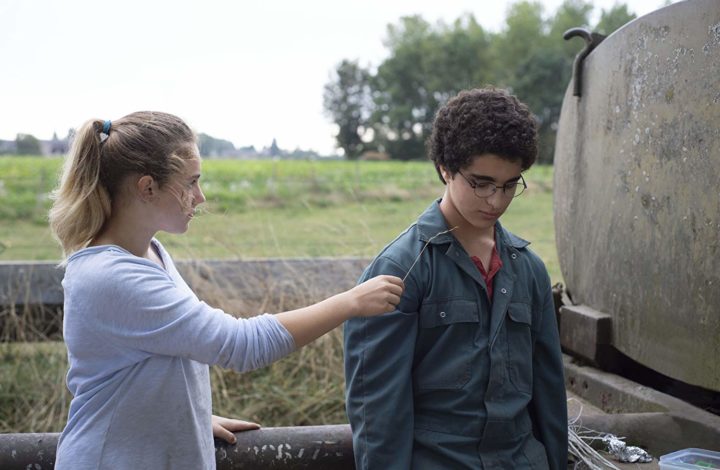
MPAA Rating: NR | Rating: ★★★★½
Release year: 2019
Genre: Coming-of-Age, Drama Director: Luc and Jean-Pierre Dardenne
I am presently writing a PhD thesis on the intersection of theology, philosophy, and film via a close viewing and interpretation of Jean-Pierre and Luc Dardenne’s post-secular cinema. Indeed, the Dardenne brothers are my primary motivation for attending Festival de Cannes this year, as their latest film Young Ahmed (Le Jeune Ahmed) is their most direct treatment and critique of religion, as well as the most conventional of their transcendent parables. Young Ahmed is certain to be the Dardenne brothers’ most divisive film in its empathetic-yet-opaque exploration of Islamic extremism via the radicalization of 13-year-old Ahmed (Idir Ben Addi), who plots to kill his teacher based on his interpretation of his local imam’s fundamentalist teachings. The film’s premise has already caused a bit of controversy on Twitter—before anyone had even seen the film, the brief plot synopsis raised questions about potential racism and cultural appropriation, calling for the Dardennes to be “cancelled” in Twitter parlance. I’m of the opinion one should see a film before making (ironically) extremist interpretations about it—so I watched Young Ahmed twice while at Cannes. It’s rare for PhD candidates in theology to see their research topic trend on film Twitter; rarer still to have one’s theological research walk into the room as living artists.
Much of Young Ahmed is true to the Dardennes’ signature style: social realism in a Belgian context, handheld camerawork and long takes, non-professional or little-known actors, an ethically knotty premise and a cathartic dénouement. What differs here is the absence of some Dardennes regulars—this is the first time Belgian actor Olivier Gourmet has not been in a Dardennes film, and while Jérémie Renier was present in Cannes promoting Ira Sachs’ Frankie, he’s also nowhere to be seen in this film. The actor most familiar within the Dardennes’ oeuvre is Myriem Akheddiou, portraying Ahmed’s teacher-turned-victim, Inès, with verve and compassion. Ahmed attends Inès’ after school classes to get support with reading and math—she helped him overcome his dyslexia when he was younger—but has recently become quietly antagonistic towards her. He’s motivated and captivated by his local imam (Othmane Moumen), whose extremist views coincide with Ahmed’s deceased cousin, a jihadist terrorist. The imam declares Inès an apostate “bitch” who is trying to destroy their religious faith. Yet Inès is also a faithful Muslim, and embodies the Islamic pillar of charity via her generous actions towards educating young people. The Twitter “cancelling” of the Dardennes seems like a misunderstanding of Islam, conflating the religion with Middle Eastern people of color, and thus stereotyping both. Instead, the Dardennes offer a mosaic of the Islamic faith as various skin tones and national backgrounds come together in for a parent meeting about a new Arabic class Inès wants to teach the youth.
When Inès confronts Ahmed at the imam’s store after the boy scolds her publicly in the meeting for dating a Jewish man and for using Arabic music to teach instead of the Qur’an, she tells him that her father faithfully taught her the Qur’an too. He responds by giving her verse references on how Islam declares Jews and Christians (“crusaders”) the enemy. Ahmed’s is a fundamentalist approach which is also easily discerned within Christianity: it’s the hermeneutic of “the Bible says it, I believe it, that settles it.” So Inès invites Ahmed to have a discussion about their differing interpretations; he says he can’t with a woman, that the Prophet won’t allow it. He says similar things to his mother (Claire Bodson), calling her a drunk and a poor Muslim. Ahmed’s and Inès’ scripture-informed worldviews are at odds, creating a conflict of interpretations which won’t be easily resolved.
Interpretation is an essential term for appreciating the Dardennes’ films, particularly Young Ahmed. Their films are, paradoxically, powerfully affecting and sympathetic while remaining somewhat detached from characters’ interiority. We are never quite sure what Ahmed is thinking and feeling throughout the film; he often seems unsure as to his motives and reasoning, running forward into the future without a real plan beyond his newfound devotion to Allah. Addi portrays him as a typical middle-school-aged boy: inarticulate, awkward, sometimes harsh and violent while other times kindhearted and caring. He wears wiry glasses, a key metaphorical motif as the story progresses—it’s how he sees the world, and the lenses we use affect our interpretations.
When his plot for violence is thwarted, he’s sent to a youth detention center. He has a caretaker (Olivier Bonnaud, seen also in The Unknown Girl) and meets with a psychologist. As part of the reparative process, Ahmed also visits and works on a local farm, where he meets Louise (Victoria Bluck), a confident teen girl who appears to like him, and whose actions will ultimately instigate the heart-pounding climactic act.
The Dardennes have been interested in questions of ethics and religious ideology long before Young Ahmed. In his published journals, On the Backs of Our Images I and II(available in English via Featherproof Books in June 2019 and 2020, respectively), Luc often writes about philosophy and theology. In one entry he shares an imagined film scenario about a religious judge in the Inquisition who condemns his own mother to death—what are the motives behind such fanaticism? Indeed, beyond religious practices, the Dardennes appear to be just as interested in how and why a young person’s imagination is wooed and molded by ideology or dogmatic beliefs, religious and otherwise.
Read the rest of my review at Fuller Studio.
IMDB Listing: https://www.imdb.com/title/tt8359822/
Leave a Reply